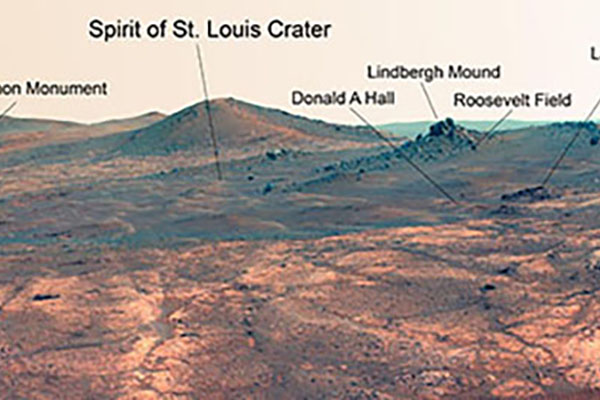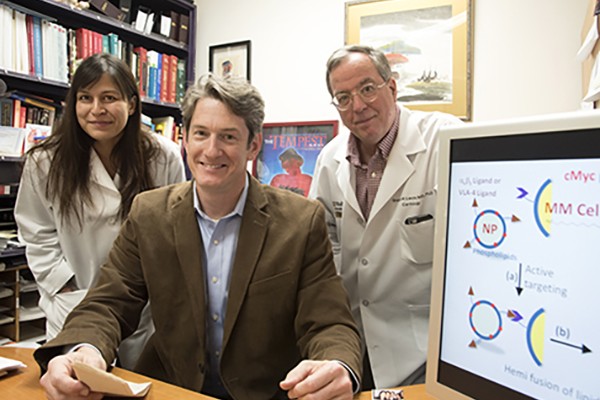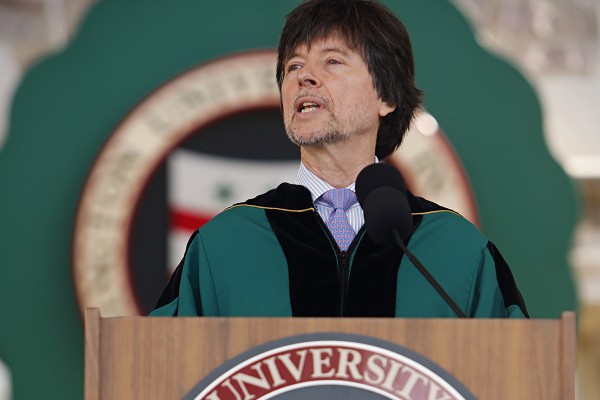Shearrer named associate vice chancellor for medical alumni and development programs
David Shearrer, a leader in fundraising initiatives at Washington University School of Medicine in St. Louis, has been named the university’s associate vice chancellor and director of medical alumni and development programs.
Cosby receives Gloria White award
Cynthia Cosby, a champion for African-American students and alumni of Washington University in St. Louis, was the 18th recipient of the Gloria W. White Distinguished Service Award. Chancellor Mark S. Wrighton presented the award to Cosby before 700 of her peers at the annual Staff Day celebration May 18.
Spirit of St. Louis on Mars
The Opportunity rover is currently exploring a Martian crater named the Spirit of St. Louis, after the famous aircraft — which was in turn named in honor of St. Louis citizens who purchased it for Charles Lindbergh. The mission team picked this naming scheme because Washington University team members spotted a promising target just beyond the crater. As long as the rover remains in the crater, the names will drawn from a list of names related to the famous flight.
Snapshots: Tiny tots and tall goodbyes
Images captured in and around the Washington University in St. Louis campuses.
Nanotherapy effective in mice with multiple myeloma
Researchers have designed a nanoparticle-based therapy that is effective in treating mice with multiple myeloma, a cancer of bone marrow immune cells. Targeted specifically to the malignant cells, these nanoparticles protect their therapeutic cargo from degradation in the bloodstream and greatly enhance drug delivery into the cancer cells.
Chancellor Wrighton’s message to the graduates
“Thank you for what you have done so far, but you have raised my expectations through your successes,” said Chancellor Mark Wrighton, at Washington University in St. Louis’ 2015 Commencement. “The future of the world depends on you!”
Burns delivers call to action to Class of 2015: ‘Set things right again’
Ken Burns delivered a sobering call to action to the Washington University in St. Louis Class of 2015 at its 154th Commencement ceremony May 15. “We broke it, but you’ve got to fix it,” he told some 15,000 graduates, parents, friends and family members gathered in Brookings Quadrangle.
Ken Burns’ 2015 Commencement address at Washington University in St. Louis
Filmmaker Ken Burns’ remarks to the Washington University in St. Louis Class of 2015. The university’s 154th Commencement ceremony was held Friday, May 15, in Brookings Quadrangle on the Danforth Campus.
The Class of 2015: ready to graduate
Surrounded by more than 12,000 family, friends, faculty, staff, administrators and university trustees, the Class of 2015 will enter Brookings Quadrangle on the Danforth Campus at 8:30 a.m. as degree candidates and leave as graduates after Chancellor Mark S. Wrighton confers their degrees.
Senior Class President Jeremy Sherman’s message to WashU’s 2015 graduates
Washington University in St. Louis Senior Class President Jeremy Sherman’s message to the graduating Class of 2015 can be found here. Sherman, from West Bloomfield, Mich., earned a bachelor of science in business administration degree from the Olin Business School with a second major in political science from the College of Arts & Sciences.
View More Stories



